| |
 |
| Transit of Venus, 2012 (Photo) |
 |
  |
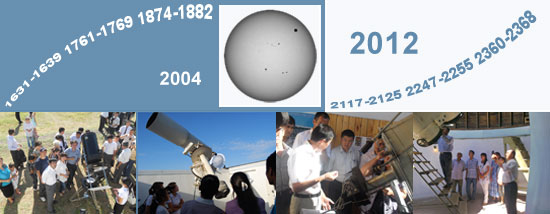 |
 |
 |
|
The transit of Venus which took place in June 6, 2012, was quite special event in Uzbekistan: it was observed in each part of the country,
almost in every city and town. In the cities as Tashkent, Samarqand, Andijan and Kitab telescopes were used for that purpose. Astronomical Institute of the Uzbek Academy of Sciences
has installed educational astronomical observatories in those cities In the past few years and they are mainly used for practical training of students. These observatories also serve for the
public outreach where everyone can observe celestial objects and sky events by his own eyes not only on TV or in Internet. |
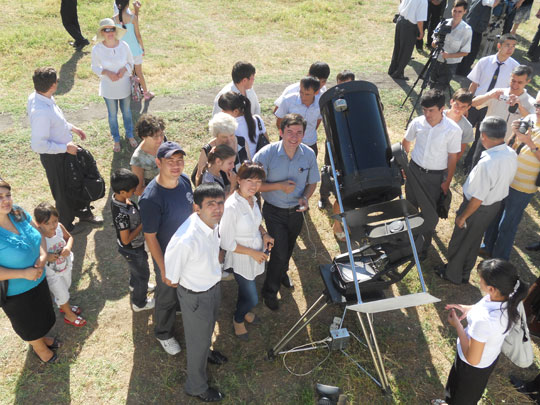 |
| Transit of Venus - Tashkent, Astronomical Institute (UBAI) |
|
The event of the transit of Venus is simply the time when the Venus is located exactly between Earth and the Sun while orbiting around it.
This happens roughly every 120 year. When it is happening one can observe Venus as small dark pebble on the face of the solar disk slowly moving across of it for several hours.
This time the Sun is near its maximum of magnetic activity (expecting to take place in 2013) and as a result many sunspots can be observe on the disk.
|
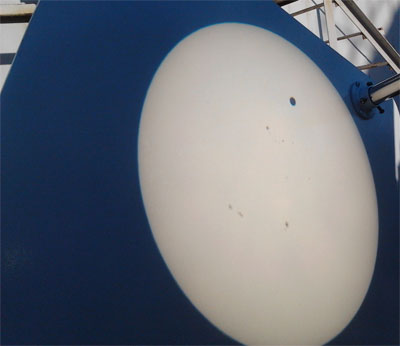 |
|
But in June 6 one of the spot was special among others having perfect round shape and being much darker. This was Venus crossing the solar disk with its 6 hours pace.
From now on it will slowly moving aways from the Sun on the sky and some time later one will see it as a very bright star on the morning sky just before sunrise.
|
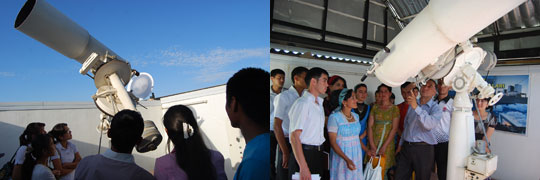 |
| Transit of Venus - Educational and Public Observatory of Andijon university |
|
One revolution of Venus around the Sun is almost 225 days long. Yet, observing from Earth, which is orbiting the Sun on larger orbit and with slower speed, Venus
is appears between Earth and the Sun with period of 584 days. Such event could take place at lower or upper location of the visible solar disk. But sometimes, roughly every 120 years,
such a transit could take place exactly over solar disk. Scientifically speaking (astronomy is serious science!) every 243 years there are 4 transits: two at winter season (with 8 years interval)
followed by long period of 121.5 years without any transit and then by summer season transits (again, with 8 years interval). For example, previous winter transits took
place in December 9, 1874 and December 6, 1882. Recent summer transit was observed in June 8, 2004, and later, after 8 years, in June 6, 2012 one more summer transit occurred.
The next transits will take place in the years of 2117 and 2125.
|
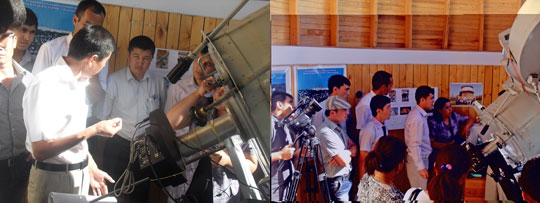 |
| Transit of Venus - Educational and Public Observatory of Samarkand university |
|
In June 6, 2012 at 3:50 a.m. Tashkent local time, long before the sunrise, Venus had began its passage over the solar disk. At 4:50 a.m., when the Sun
appeared over the horizon it already had a "beauty spot" on its "cheek" which disappeared later at 9:53 a.m. local time.
|
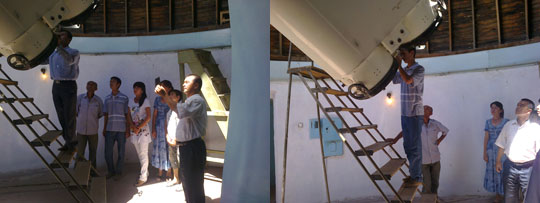 |
| Transit of Venus - Kitab station of UBAI |
|
In XVIII century observation of Venus transit had a significant scientific value. By measuring the precise time of the first and second contacts
(the moments when Venus touches the solar disk), as well as the third and fourth contacts at some locations with known coordinates it was possible to measure the
astronomical unit - average distance between Earth and the Sun. This unit is a kind of uniform scale of distances in solar system. In our time its value is known with high
precision by means of radio-location of Venus. In XXI century we can easily repeat observations performed by expeditions distributed around the globe (long time ago it took
many years of sailing through the sees and oceans with quite frequently tragic ending). At present time one need to measure the precise moments mentioned above as well as
the coordinates of location and send it using mobile phone to particular Internet site. Because such information can be obtained from America, Asia, Europe and even from
South-East Asia and Oceania (indeed, mobile phones in our time can be found everywhere) the value of astronomical unit can be measured with very high accuracy.
|
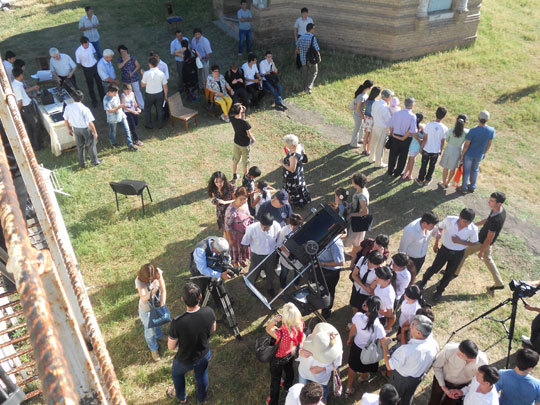 |
| Transit of Venus - Tashkent, Astronomical Institute (UBAI) |
|
There is one more interesting program proposed by International Astronomical Union related to transit of Venus. I named it as "sentimental".
It suggested to make photos of your beloved and belonging. For instance it could be your parents, spouse or finance, your sweet home and favored flowers, native city etc.
Based on these photos the message to people in the future who will observe the next transit of Venus in 2117 will be composed. From this message they will know what kind
of people lived in 2012, what they loved, were fond of, liked to.
|
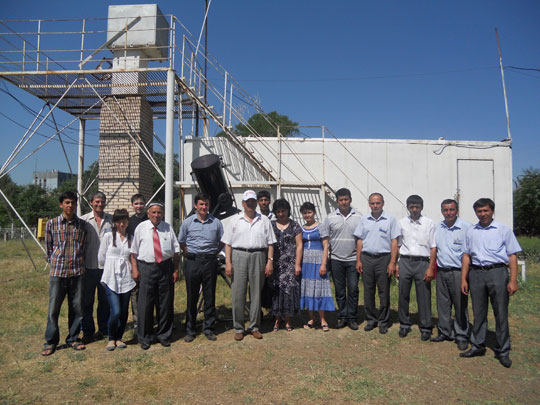 |
|